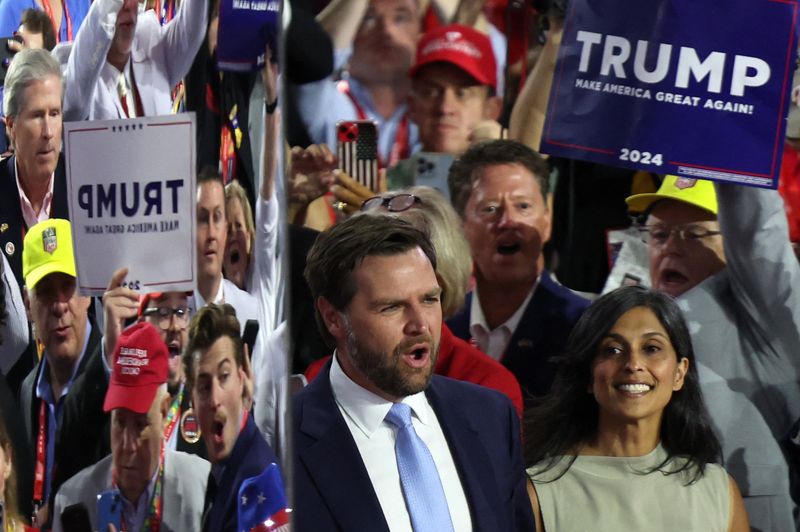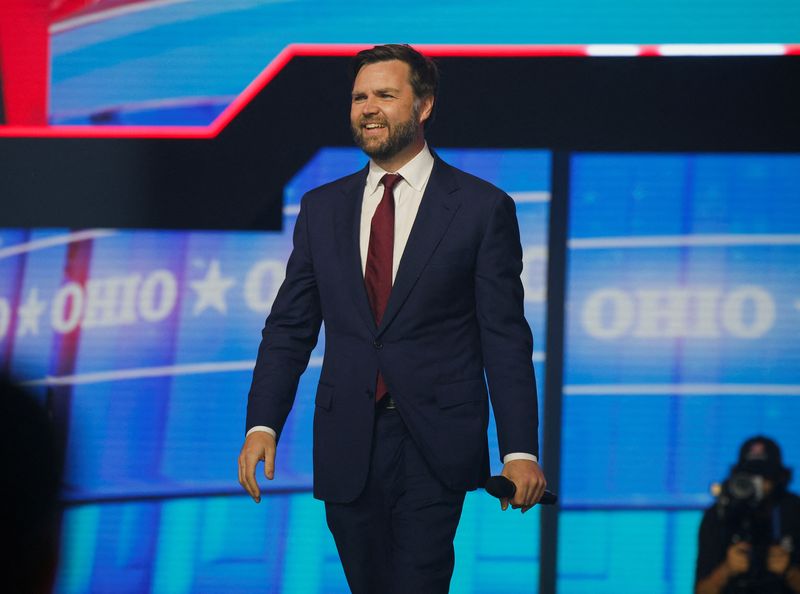By Gram Slattery, Alexandra Ulmer and Nathan Layne
MILWAUKEE (Reuters) -Republican Donald Trump selected J.D. Vance, a U.S. senator from Ohio and author of the bestselling memoir "Hillbilly Elegy," as his running mate on Monday, elevating a politician who once criticized the former president in acid terms but has since become one of his most stalwart defenders.
The news, the subject of intense speculation in recent weeks, emerged at the start of the four-day Republican National Convention in Milwaukee to nominate the party's presidential ticket. Soon after, Vance appeared at the event to the applause of party delegates but did not give any remarks.
"After lengthy deliberation and thought, and considering the tremendous talents of many others, I have decided that the person best suited to assume the position of Vice President of the United States is Senator J.D. Vance of the Great State of Ohio," Trump wrote on his Truth Social media website.
The selection of James David Vance could help boost turnout for Trump in the Nov. 5 election, particularly in some of the "Rust Belt" states where the election will likely be decided. The Ohio native is deeply popular with the Republican candidate's base, and his populist message is well-suited for states that have significant working-class white populations and have suffered from de-industrialization.
A staunch conservative, Vance is unlikely to bring many new voters into Trump's corner, however, and may even alienate some moderates. Some of Trump's supporters had pushed him to select a woman or person of color as his No. 2 to expand a coalition that skews toward white men.
Several advisers to Trump said the former president, who survived an assassination attempt at a Pennsylvania campaign rally on Saturday, had focused on choosing a running mate he trusted and got along with.
Among those who had privately advocated for Vance, according to several sources familiar with the matter, were Trump's eldest son, Donald Trump Jr., and conservative commentator Tucker Carlson.
Though several donors told Reuters they were disappointed by the pick, another donor, oil businessman Dan Eberhart, saw the choice as a sign of Trump's confidence in his campaign against President Joe Biden. Polls show the men locked in a tight race nationally, but Trump has a measurable lead in most of the battleground states that will decide the election.
"It demonstrates that Trump doesn't feel he needs his VP to deliver any specific demographic or state," Eberhart said. "He's confident that he has this race wrapped up."
In selecting Vance, Trump passed over other contenders, including U.S. Senators Marco Rubio and Tim Scott and North Dakota Governor Doug Burgum.
At 39, Vance represents a younger generation in an election that features Trump, 78, and Biden, 81, bringing a counterweight to the Democratic ticket that also includes Vice President Kamala Harris, 59.
Vance's rapid ascent has been unusual for American politics. After an impoverished childhood in southern Ohio, he served in the Marine Corps, won a scholarship to Yale Law School and later worked as a venture capitalist in San Francisco.
He rose to prominence after 2016 when he wrote "Hillbilly Elegy," in which he explored the socioeconomic problems confronting his hometown.
The book criticized what Vance saw as a self-destructive culture in rural America and sought to explain Trump's popularity among poor white Americans.
Vance himself was harshly critical of Trump before and after Trump's 2016 election win against Democratic presidential nominee Hillary Clinton, calling him an "idiot" and "America's Hitler," among other epithets.
But as Vance geared up to run for the U.S. Senate in Ohio in 2022, he transformed into one of the former president's most consistent defenders, supporting Trump even when some Senate colleagues declined to do so.
Vance has played down the Jan. 6, 2021, attack on the U.S. Capitol, and he has echoed Trump's criticisms of the way the U.S. Justice Department has prosecuted Jan. 6 rioters, accusing the department of disregarding due process protections.
While the Republican Party historically stood for free markets and embraced foreign intervention as an important national security tool, Trump's 2016 election opened up significant rifts within the party. Vance has been one of the most vocal opponents of continued aid to Ukraine in the Senate, a stance at odds with many Republican legislative leaders.
On the campaign trail, the former venture capitalist has also served as a bridge between Trump associates and wealthy Silicon Valley donors, many of whom have opened their wallets to Trump this election.
FRAUGHT SELECTION PROCESS
Vance's anti-corporate rhetoric and his opposition to Ukraine aid gave some donors pause, and four donors told Reuters in the moments after the selection that they felt let down. Many contributors to the campaign were hoping for a business-friendly nominee who would expand the electoral map.
"Of all the choices he had, I think he chose the worst one," said donor and metals businessman Andy Sabin, who had been waiting for Trump's pick for running mate to see whether he would donate to the campaign.
"Vance is going to hurt Trump more than help him," Sabin said, citing Vance's Ukraine stance. "Now I definitely won't donate."
At least some senior campaign advisers were partial to Rubio, according to a source with direct knowledge of the matter. Rubio has significant political experience and might have helped boost the former president's support among Latinos.
Trump's vice presidential selection process was drawn out and calibrated for maximum suspense.
While the former president started with an informal long list of at least a dozen people, he had whittled down his options over the course of 2024, with Vance, Burgum and Rubio emerging as the most serious contenders. Mike Pence, who twice served as Trump's running mate, declined to endorse his former boss in this year's election.
Many of Trump's closest advisers did not know until Monday who the former president would pick.

Biden told reporters on Monday that Vance was a "clone" of Trump when it comes to policy issues. The Democratic president's campaign, in a separate call with reporters, criticized Vance for his record advocating against abortion rights.
While Vance recently said he opposed federal restrictions on the use of abortion pills, a position Trump shares, he has frequently expressed support for abortion restrictions in the past. In a 2021 interview, for instance, he implied that victims of rape and incest should be required to carry pregnancies to term.
